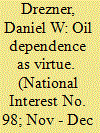|
|
|
Sort Order |
|
|
|
Items / Page
|
|
|
|
|
|
|
| Srl | Item |
| 1 |
ID:
106086


|
|
|
| 2 |
ID:
098682


|
|
|
|
|
| Publication |
2010.
|
| Summary/Abstract |
Energy is the lynchpin of modern society. Since the early 1970s, growing dependence on foreign energy sources, oil in particular, has constrained US independence in foreign policy, and at times, inhibited economic stability and growth. Addressing oil dependence is politically and economically complex. Proposed solutions are multifaceted with various objectives such as energy efficiency and resource substitution. One solution is the partial transition from an oil- to coal-based economy. A number of facts support this solution including vast coal reserves in the US and the relative price stability of coal. However, several roadblocks exist. These include uncertain recoverable reserves and the immaturity of "clean" coal technologies. This paper provides a first order analysis of the most efficient use of coal assuming the transition from oil to coal is desirable. Scenario analysis indicates two possible transition pathways: (1) bring the transportation sector onto the electric grid and (2) use coal-to-liquid fuels to directly power vehicles. The feasibility of each pathway is examined based on economic and environmental factors, among which are energy availability, affordability and efficiency, and environmental sustainability. Results indicate that partial transition of the transportation sector onto the electric grid offers the more viable solution for coal-based reduction of the US oil dependence.
|
|
|
|
|
|
|
|
|
|
|
|
|
|
|
|
| 3 |
ID:
094828


|
|
|
|
|
| Publication |
2010.
|
| Summary/Abstract |
Stochastic simulation of the direct economic costs of oil dependence in an uncertain future is proposed as a useful metric of oil dependence. The market failure from which these costs arise is imperfect competition in the world oil market, chiefly as a consequence of the use of market power by the Organization of the Petroleum Exporting Countries (OPEC) cartel. Oil dependence costs can be substantial. It is estimated that oil dependence costs to the US economy in 2008 will exceed $500 billion. Other costs, such as military expenditures or foreign policy constraints are deemed to be largely derivative of the actual or potential economic costs of oil dependence. The use of quantifiable economic costs as a security metric leads to a measurable definition of oil independence, or oil security, which can be used to test the ability of specific policies to achieve oil independence in an uncertain future.
|
|
|
|
|
|
|
|
|
|
|
|
|
|
|
|
| 4 |
ID:
084337


|
|
|
|
|
| Publication |
2008.
|
| Summary/Abstract |
Imagine a world free of oil-one with diversified Arab economies divorced from the dollar, African nations devoid of the resource curse, and China and India ascendant. As it turns out, a world without oil dependence is a world that doesn't need an American superpower.
|
|
|
|
|
|
|
|
|
|
|
|
|
|
|
|
| 5 |
ID:
120869


|
|
|
|
|
| Publication |
2013.
|
| Summary/Abstract |
The article predicts changes in global and regional incidences of armed conflict for the 2010-2050 period. The predictions are based on a dynamic multinomial logit model estimation on a 1970-2009 cross-sectional data set of changes between no armed conflict, minor conflict, and major conflict. Core exogenous predictors are population size, infant mortality rates, demographic composition, education levels, oil dependence, ethnic cleavages, and neighborhood characteristics. Predictions are obtained through simulating the behavior of the conflict variable implied by the estimates from this model. We use projections for the 2011-2050 period for the predictors from the UN World Population Prospects and the International Institute for Applied Systems Analysis. We treat conflicts, recent conflict history, and neighboring conflicts as endogenous variables. Out-of-sample validation of predictions for 2007-2009 (based on estimates for the 1970-2000 period) indicates that the model predicts well, with an area under the receiver operator curve of 0.937. Using a p > .30 threshold for positive prediction, the true positive rate 7-9 years into the future is 0.79 and the False Positive Rate 0.085. We predict a continued decline in the proportion of the world's countries that have internal armed conflict, from about 15% in 2009 to 7% in 2050. The decline is particularly strong in the Western Asia and North Africa region and less clear in Africa south of Sahara. The remaining conflict countries will increasingly be concentrated in East, Central, and Southern Africa and in East and South Asia.
|
|
|
|
|
|
|
|
|
|
|
|
|
|
|
|
| 6 |
ID:
093086


|
|
|
|
|
| Publication |
2009.
|
| Summary/Abstract |
The 'resource curse' hypothesis claims that abundance in natural resources, particularly oil, encourages especially civil war. Natural resources provide both motive and opportunity for conflict and create indirect institutional and economic causes of instability. Contrarily, the theory of the rentier state - largely neglected in the study of peace and war in this respect - suggests that regimes use revenue from abundant resources to buy off peace through patronage, large-scale distributive policies and effective repression. Consequently, such rentier states would tend to be more stable politically and less prone to conflict. These two theories thus imply ambivalent effects of resource abundance on conflict proneness. This article presents part of a solution to this apparent puzzle for the case of oil-producing countries. The key argument is that both resource wealth per capita and resource dependence need to be taken into account, since only the availability of very high per capita revenues from oil allows governments to achieve internal stability. The empirical analysis supports this hypothesis. The findings of multivariate cross-country regressions indicate a U-shaped relationship between oil dependence and civil war onset, while high resource wealth per capita tends to be associated with less violence. The results of a macro-qualitative comparison for a reduced sample of highly dependent oil exporters are even more clearcut. Using the same reduced sample, we find that oil-wealthy countries apparently manage to maintain political stability by a combination of large-scale distribution, high spending on the security apparatus and protection by outsiders. Compared to oil-poor countries and in contradiction to the rentier state theory, the institutions of oil-wealthy countries do not seem to be particularly characterized by patronage and clientelism.
|
|
|
|
|
|
|
|
|
|
|
|
|
|
|
|
|
|
|
|
|